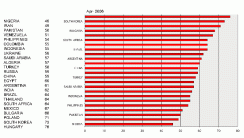Venezuela and Turkey DESIX scores fall in April due to oil sector expropriations and a stalled central bank appointment
by Patrick Esteruelas and Kaan Nazli
Venezuela and Turkey were the two biggest movers in this month’s Deutsche Bank Eurasia Group Stability Index (DESIX), both sliding by two points from the previous month’s scores. Venezuela reversed last month’s gains to fall back to an overall score of 51, largely due to an unprecedented wave of expropriations in the oil sector that worsened the environment for the private sector. Turkey’s stability rating dropped to 58 mainly because of the government’s delay in appointing a central bank governor, which raised serious concerns about the government’s commitment to sound monetary policy.
Venezuela’s decision to temporarily expropriate two fields operated by France’s Total and Italy’s Eni after both firms failed to agree by deadline to convert existing service agreements to new joint ventures under state majority caused a five-point drop in the overall society score. While a majority of operators have reluctantly accepted tighter terms in order to preserve their assets and fall under consideration for future projects, they will think twice before making any medium- and long-term investment commitments should terms worsen and oil prices moderate or decline. The government has shown a newfound willingness to expropriate both strategic and non-strategic assets, despite previously shying away from expropriating assets in the hydrocarbons sector out of fear of driving away existing and potential investment. Adding to worries about stability in Venezuela are new signs of increased spending and mounting concerns over crime and a lack of security throughout the country.
In Turkey, the government finally appointed Durmus Yilmaz, a member of the interest rate-setting Monetary Policy Council, to head Turkey’s central bank on April 18. However, Ankara’s failure throughout March to appoint Adnan Buyukdeniz, general director of Islamic finance organization Al Baraka Turk, to the position raised concerns about the government’s commitment to sound monetary policies. To make matters worse, the government appeared more willing to appease exporters with initiatives that may contradict fiscal targets set within the $10 billion standby arrangement.
Security and society ratings remained stable in March as much-feared clashes between security services and the predominantly Kurdish population of Turkey's southeast failed to transpire during the celebrations around the 25 March Nowruz holiday. However, the issue of terrorism continued to dominate headlines, as the armed forces killed militants of the separatist Kurdistan Workers Party in the biggest operation against the group so far in 2006.







